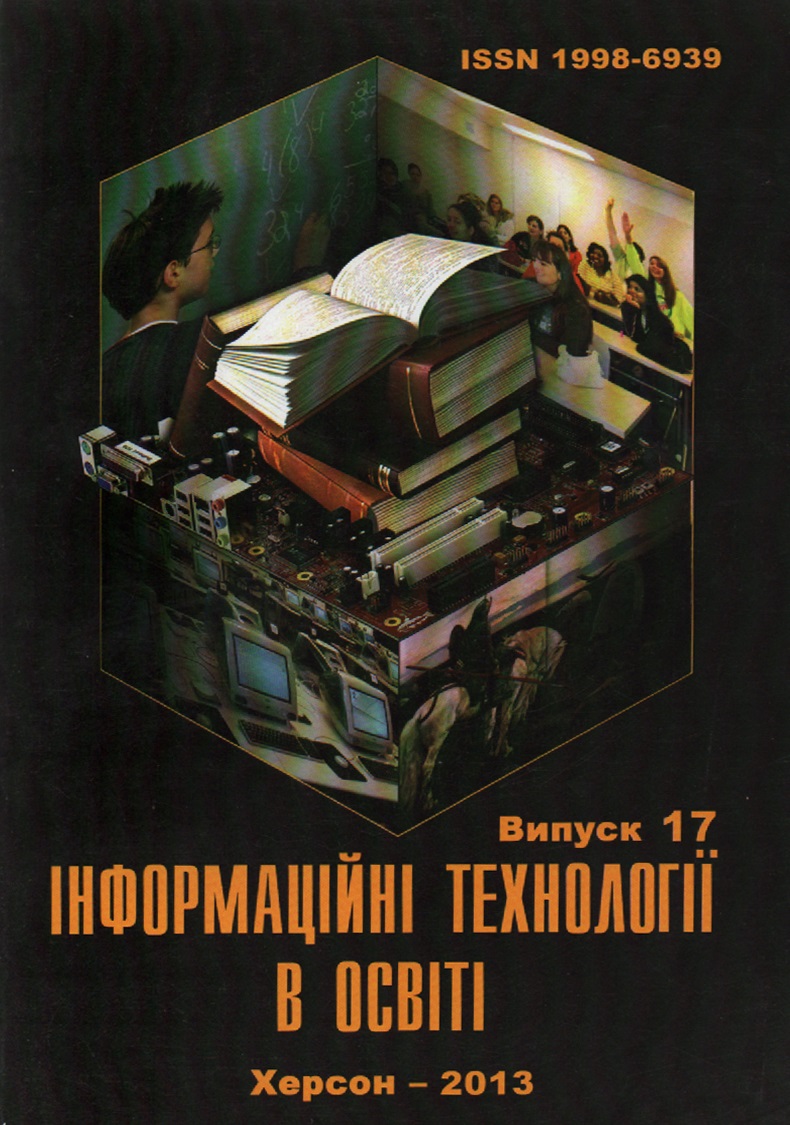ВИКОРИСТАННЯ ХМАРНИХ ОБЧИСЛЕНЬ ДЛЯ РОЗВИТКУ ІНФОРМАЦІЙНО-КОМУНІКАЦІЙНОЇ КОМПЕТЕНТНОСТІ ВЧИТЕЛІВ
DOI:
https://doi.org/10.14308/ite000454Ключові слова:
хмарні обчислення, хмарні технології, підвищення кваліфікації вчителів, інформаційні та комунікаційні компетенція, програмне забезпечення, програмне забезпечення як послугаАнотація
Стаття присвячена проблемі розвитку інформаційно-комунікаційної компетентності вчителів за допомогою використання хмарних обчислень. Здійснюється аналіз сучасних підходів до використання хмарних технологій та проектів для професійного розвитку вчителів та розвитку інформаційно-комунікаційної компетентності вчителів. Пропонуються основні характеристики хмарних обчислень провідних компаній Google, Microsoft, IBM, з точки зори їх необхідності для здійснення навчального процесу в мережі Інтернет. Описуються дії цих компаній та інші навчальні проекти, метою яких є розвиток інформаційно-комунікаційної компетентності вчителів за допомогою хмарних обчислень. Наводяться приклади шляхів рішення проблеми розвитку інформаційно-комунікаційної компетентності вчителів за допомогою використання сучасних інформаційно-комунікаційних технологій. Запропонована модель розвитку інформаційно-комунікаційної компетентності вчителів на базі хмарних обчислень, виділені основні вимоги та елементи цієї моделі.
Завантаження
Показники метрики:
Посилання
1. Fourth International Conference on Microsoft “Education in the 21st century. The transformation of education in the information society: http://www.microsoft.com/Rus/Edu2010/Default.mspx. (29.04.2010)
2. Bykov V. Yu.: Models of the Open Education Organizational Systems: Monograph. – Kyiv: Atika,– 684 p. (2009) (In Ukrainian)
3. Justin Reich, Thomas Daccord, Alan November. Best Ideas for Teaching with Technology: A Practical Guide for Teachers, by Teachers. New York: M.E. Sharpe,– 291 p. (2008)
4. Virginia A. Scott. Google. Corporations that changed the world. USA: Greenwood Publishing Group, – 153 p. (2008)
5. Alec M. Bodzin, Beth Shiner Klein, Starlin Weaver. The Inclusion of Environmental Education in Science Teacher Education. USA: Springer,– 352 p. (2010)
6. Kogan L.N.: Culture in conditions of scientific and technological revolution. – Saratov: University Press, – 153 p. (1987) (In Russian)
7. Defenition and Selection of Competencies: Theoretical and Conceptual Foundations (DeSeCo). Revised December: http://www.oecd.org/education skills-beyond-school/41529556.pdf. (2001)
8. Soroko N.V.: Didactics functions of information and communication technologies in the professional activity of teacher philologist. Information technology and learning tools - Issue 1. - S. 45: http://www.nbuv.gov.ua/e-journals/ITZN/em5/emg.html (2008) (In Ukrainian)
9. UNESCO ICT Competency Framework for Teachers: http://unesdoc.unesco.org/images/0021/002134/213475e.pdf (2011)
10. Guizzardi, R. S. S., Aroyo, L., Wagner, G. Agent-oriented Knowledge Management in Learning Environments: A Peer-to-Peer Helpdesk Case Study. In [8]. ― 57–72 pp.
11. Michael Miller. Cloud Computing: Web-Based Applications That Change the Way You Work and Collaborate Online. Que Publishing– 312 р. (2008)
12. William Y. Chang, Hosame Abu-Amara, Jessica Sanford. Transforming Enterprise Cloud Services. Springer 428 p. (2010)
13. Tejaswi Redkar, Tony Guidici. Windows Azure Platform. Second edition: Apress – 650 p. (2011)
14. Soroko N.V., Shynenko M.A.: Future Development of Softwarre as a Service to Create Documents of Electronic Libraries by the Example of MICROSOFT OFFICE 365. Pedagogical Sciences of Ukraine - Volume 26, № 6: http://www.nbuv.gov.ua/e-journals/ITZN/em5/emg.html (2011) (In Ukrainian)
15. Fundacion German Sanchez Ruiperez and IBM Implement a Cloud Computing Solution for Education: http://goliath.ecnext.com/coms2/gi_0199-13346074/Fundacion-German-Sanche....
</uk>
<en>
1. Fourth International Conference on Microsoft “Education in the 21st century. The transformation of education in the information society: http://www.microsoft.com/Rus/Edu2010/Default.mspx. (29.04.2010)
2. Bykov V. Yu.: Models of the Open Education Organizational Systems: Monograph. – Kyiv: Atika,– 684 p. (2009) (In Ukrainian)
3. Justin Reich, Thomas Daccord, Alan November. Best Ideas for Teaching with Technology: A Practical Guide for Teachers, by Teachers. New York: M.E. Sharpe,– 291 p. (2008)
4. Virginia A. Scott. Google. Corporations that changed the world. USA: Greenwood Publishing Group, – 153 p. (2008)
5. Alec M. Bodzin, Beth Shiner Klein, Starlin Weaver. The Inclusion of Environmental Education in Science Teacher Education. USA: Springer,– 352 p. (2010)
6. Kogan L.N.: Culture in conditions of scientific and technological revolution. – Saratov: University Press, – 153 p. (1987) (In Russian)
7. Defenition and Selection of Competencies: Theoretical and Conceptual Foundations (DeSeCo). Revised December: http://www.oecd.org/education skills-beyond-school/41529556.pdf. (2001)
8. Soroko N.V.: Didactics functions of information and communication technologies in the professional activity of teacher philologist. Information technology and learning tools - Issue 1. - S. 45: http://www.nbuv.gov.ua/e-journals/ITZN/em5/emg.html (2008) (In Ukrainian)
9. UNESCO ICT Competency Framework for Teachers: http://unesdoc.unesco.org/images/0021/002134/213475e.pdf (2011)
10. Guizzardi, R. S. S., Aroyo, L., Wagner, G. Agent-oriented Knowledge Management in Learning Environments: A Peer-to-Peer Helpdesk Case Study. In [8]. ― 57–72 pp.
11. Michael Miller. Cloud Computing: Web-Based Applications That Change the Way You Work and Collaborate Online. Que Publishing– 312 р. (2008)
12. William Y. Chang, Hosame Abu-Amara, Jessica Sanford. Transforming Enterprise Cloud Services. Springer 428 p. (2010)
13. Tejaswi Redkar, Tony Guidici. Windows Azure Platform. Second edition: Apress – 650 p. (2011)
14. Soroko N.V., Shynenko M.A.: Future Development of Softwarre as a Service to Create Documents of Electronic Libraries by the Example of MICROSOFT OFFICE 365. Pedagogical Sciences of Ukraine - Volume 26, № 6: http://www.nbuv.gov.ua/e-journals/ITZN/em5/emg.html (2011) (In Ukrainian)
15. Fundacion German Sanchez Ruiperez and IBM Implement a Cloud Computing Solution for Education: http://goliath.ecnext.com/coms2/gi_0199-13346074/Fundacion-German-Sanche....
</en>
##submission.downloads##
Опубліковано
Як цитувати
Номер
Розділ
Ліцензія
This work is licensed under a Creative Commons Attribution-NonCommercial-ShareAlike 4.0 International License.






























